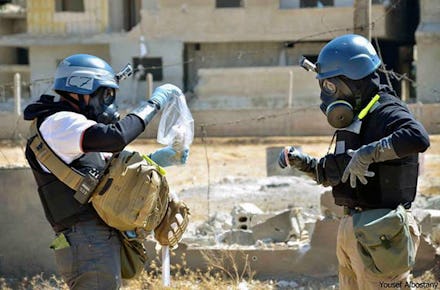Syria's Chemical Weapons Disposal Proves the U.S. Does At Least Something Right

Between the debt ceiling crisis and government shutdown (which are finally over, for now), as well as the shaky rollout of Obamacare, it may be hard to imagine the U.S. government doing anything right these days, but America's response to the Syrian civil war, of all things, seems to be working pretty well.
Back in August, doomsayers had low expectations for a Russian-sponsored initiative to send chemical weapons inspectors to Syria to clear out Bashar al-Assad's stockpiles of deadly toxins — like the nerve agent used to kill over 1,000 Syrians in an attack at the end of August. They said President Obama would regret not following through on his threat to command punitive air strikes.
Well, today, the inspectors say they are almost halfway done with inspecting Assad's chemical weapons sites and have just run into their first obstacle: This is a far cry from the endless obfuscation and delays by the regime the pro-intervention camp gloatingly predicted. This doesn’t mean Bashar al-Assad is suddenly a good guy, but it does seem to indicate that his regime responded rationally to a credible threat of force and is toeing the American line on chemical weapons.
Meanwhile, a peace conference between the Syrian regime and rebels, which both the U.S. and Russia have been trying to get under way for months, has finally been scheduled to take place in late November. So far, the regime seems more enthusiastic than the opposition about the “Geneva 2” talks — perhaps because it now has the upper hand in the conflict — but there is still time for the U.S. to convince the rebel holdouts that participating is the best way for them to protect their interests and play a constructive role in ending the conflict.
The U.S. State Department would be wise to throw its full support behind Geneva 2, not because it is an immaculate solution but rather because Syria, the U.S., and the world all stand to benefit from a peaceful solution to Syria's conflict. The peace talks may be uncomfortable, especially since most of the parties involved are pretty unsavory, but they are the best option for finding a workable political solution to Syria's conflict without more needless suffering, death, and displacement.
In two and a half years, the Syrian civil war has killed over 100,000 Syrians and produced over two million refugees and millions more internally displaced people. Why let it drag on any longer if international diplomatic intervention can put a stop to it?
Also in Geneva, the U.S. and other world powers revived talks with Iran this week over the country's nuclear program. The severe tensions between Washington and Tehran over this issue seem to be abating — hopefully enough that this round of talks will produce a deal (and judging from the apoplexy this rapprochement has caused in Israel and Saudi Arabia, chances are better than ever).It is hard to imagine talks like these moving forward had the U.S. gone ahead with its planned military intervention in Syria, since the Assad regime has long been one of Iran’s key allies in the Arab world.
Iran and the U.S. still do not see eye-to-eye on Syria: the government of recently elected Iranian President Hassan Rouhani remains in favor of Assad staying in power. That, however, is a poor excuse for excluding Iran from the international diplomatic drive to end the Syrian civil war. The State Department should drop the conditions it has set for Iranian participation in Geneva 2, as surely they know that Rouhani could not publicly express support for a transitional authority in Syria (i.e., one without Assad) even if he wanted to. The US would be better off giving Iranians a seat at the table and seeing firsthand how they approach the peace process, if for no other reason than to better understand how the Rouhani administration approaches diplomacy.
However, there is one aspect of the Syrian conflict to which the U.S. could respond better: the refugee crisis. In late September, President Obama announced $339 million in additional aid to displaced people in Syria and neighboring countries. This generous assistance package will help to address a severe shortage in resources for refugees, especially in the hardest hit countries, Jordan and Lebanon. As such, the aid package should be commended.
Unfortunately, the U.S. remains reluctant to open its own borders to Syrian refugees, even those in severe need of relocation and those with relatives who are American citizens. Even France, with its right wing, anti-immigrant government, is letting in 500 asylum seekers, and there is no reason why the U.S. can’t accommodate more refugees than the 2,000 it accepted in early August. Aid money is all well and good, but granting asylum would send a more forceful message of American concern and generosity at a time when the U.S. could use a boost to its image in the Middle East. Let's hope the U.S. makes good on its offer to resettle more Syrian refugees.